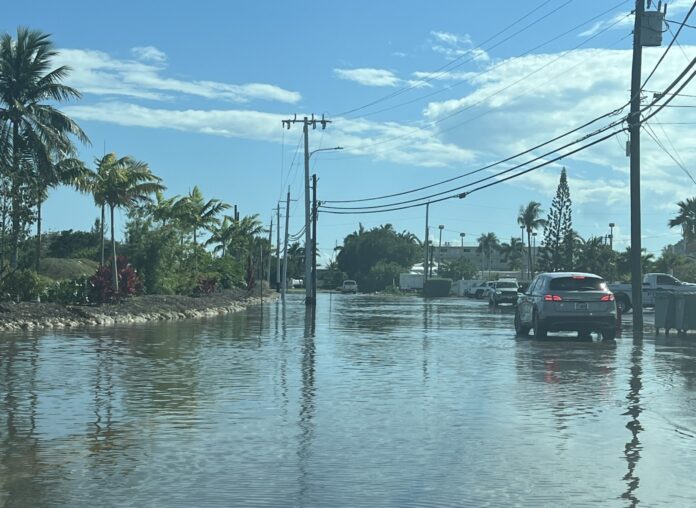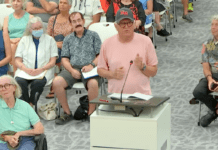
Already under fire from Marathon residents in recent months, an upcoming resort at the Florida Keys Country Club will contest legal challenges from a lawsuit filed against the resort owners and the city of Marathon on July 19.
Naming developer Michael Aranda Jr.’s corporation QOF Inc. as its plaintiff and both the city of Marathon and property owner Florida Keys Resort Holdings LLC as defendants, the suit requests injunctive relief to enforce the resort’s existing development agreement.
QOF owns two newly-constructed homes on the west end of Sombrero Boulevard, past an extremely flood-prone area of the road that has become nearly impassable at multiple points during rain events in the last two years.
The 159-page complaint alleges, among several other items, that the upcoming Florida Keys Resort has violated multiple conditions of its development agreement and that the agreement should be voided.
The suit details what it claims are failures to adhere to the agreement’s timelines for commencement of construction – focusing largely on required workforce housing units attached to the project – and the development’s adverse effects on surrounding properties by exacerbating flooding on Sombrero Boulevard.
An earthen berm constructed in early 2022, already the target of residents’ ire, remains in the spotlight throughout the complaint for its alleged role in severe flooding.
Resort owner Peter Rosasco has previously told the Weekly that the berm’s construction was required for the development to retain its stormwater on site, and that before this point, the golf course property had functioned as a drainage area for the majority of Sombrero Boulevard, including properties on the road’s north side with no stormwater retention capabilities.
The suit acknowledges the “drainage pattern along almost all of Sombrero Boulevard is from north to south.”
In previous workshops to address the flooding, city staff and engineers have acknowledged a combination of impermeable soil on the road’s southern edge, construction of the berm, an inadequate drainage system and extreme rain events as contributing factors to heavily-publicized flooding on the road. Recent rain events have left multiple vehicles disabled and in some cases have prevented residents from accessing their homes.
In addition to allegations that the berm was not included in plans submitted for permitting to the South Florida Water Management District, the suit states that “the Developer erected the berm to alter the normal stormwater drainage pattern of Sombrero Boulevard for the benefit of its sitework operations on the Golf Course … (and) because the retention ponds on its property are at capacity.”
Other language states that the berm’s construction runs contrary to policies in Marathon’s comprehensive plan for management of stormwater and prevents area residents from safely and efficiently evacuating their homes in the event of a hurricane or similar storm.
Marathon is in the process of addressing the flooding with an upgraded pump system projected to cost upwards of $1 million. Details of that plan, including a three-pump system capable of forcing 4,500 gallons per minute each down existing stormwater injection wells, were outlined in a report sent to South Florida Water Management District bureau chief Jesse Markle by engineer Steve Suggs of Weiler Engineering on July 19. The report includes an analysis of factors contributing to the flooding, while the city claims that the upgraded system will be capable of clearing historic storm events, such as the deluge on May 20 of this year, in four to six hours.
Along with removal of the berm or installation of culverts, the suit suggests that responsibility for completion of the pump system should shift to the development owners, in line with Aranda’s public comments during Marathon’s June 25 workshop to address resident concerns over the flooding.
“What I’m hearing now is that taxpayers are going to pay for (the drainage system),” Aranda said. “When you come to do a development, would it not be reasonable for the taxpayers to ask the city council or staff to ask the developer, ‘Have you done an assessment of the area surrounding it? And if so, how is it going to impact it?’ I don’t see how in the world you expect taxpayers who had their homes flooded from a guy developing a golf course into a resort to pay for these improvements.”
The city has maintained that the upgraded system should finish construction between June and October of 2025. Speaking with the Weekly on the morning of July 31, City Manager George Garrett said it was unclear whether the new suit would affect this timeline.
Though he declined to comment on specific allegations in the suit, Marathon City Attorney Steve Williams told the Weekly that “on its face, a preliminary review of the Complaint appears to outline contention between the Plaintiff and Florida Keys Resort Holdings LLC, with no damages being sought against the city.”
The Weekly reached out to resort owner Peter Rosasco by phone for comment on the suit, but was unable to reach him before press time.
The case is currently assigned to Judge Mark Jones. A hearing date has not been set.






















